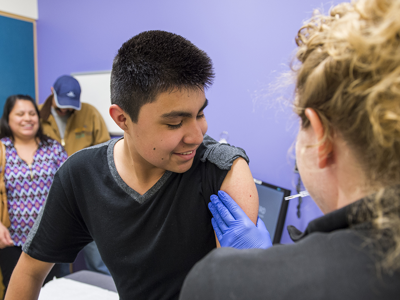- Doctors & Departments
-
Conditions & Advice
- Overview
- Conditions and Symptoms
- Symptom Checker
- Parent Resources
- The Connection Journey
- Calm A Crying Baby
- Sports Articles
- Dosage Tables
- Baby Guide
-
Your Visit
- Overview
- Prepare for Your Visit
- Your Overnight Stay
- Send a Cheer Card
- Family and Patient Resources
- Patient Cost Estimate
- Insurance and Financial Resources
- Online Bill Pay
- Medical Records
- Policies and Procedures
- We Ask Because We Care
Click to find the locations nearest youFind locations by region
See all locations -
Community
- Overview
- Addressing the Youth Mental Health Crisis
- Calendar of Events
- Child Health Advocacy
- Community Health
- Community Partners
- Corporate Relations
- Global Health
- Patient Advocacy
- Patient Stories
- Pediatric Affiliations
- Support Children’s Colorado
- Specialty Outreach Clinics
Your Support Matters
Upcoming Events
Colorado Hospitals Substance Exposed Newborn Quality Improvement Collaborative CHoSEN Conference (Hybrid)
Monday, April 29, 2024The CHoSEN Collaborative is an effort to increase consistency in...
-
Research & Innovation
- Overview
- Pediatric Clinical Trials
- Q: Pediatric Health Advances
- Discoveries and Milestones
- Training and Internships
- Academic Affiliation
- Investigator Resources
- Funding Opportunities
- Center For Innovation
- Support Our Research
- Research Areas

It starts with a Q:
For the latest cutting-edge research, innovative collaborations and remarkable discoveries in child health, read stories from across all our areas of study in Q: Advances and Answers in Pediatric Health.


The Truth About Vaccines: What Parents Need to Know

The use of vaccines has led to major improvements in child and public health. If you’re old enough to have kids, chances are you had chickenpox growing up or knew someone who did. Your parents may have had measles, and your grandparents might have had polio. Those diseases no longer affect most children in the U.S. today.
That’s thanks to vaccines. As parents and caregivers, we all want to make sure our children are healthy and protected from harm. Vaccination is one of the best ways to do just that. In fact, vaccines routinely given to infants, children and teens in the U.S. today protect them from 16 potentially harmful diseases.
Even so, many parents may have questions and concerns about vaccines, and that’s understandable. Our pediatric infectious disease expert Sean O’Leary, MD, MPH, explains the truth about vaccines: how they work and why they offer the best possible protection against serious and even deadly diseases.
How vaccines work
When a virus or disease enters the body, it’s the immune system’s job to identify the virus as a threat and then fight it off. Vaccines are designed to train the immune system. They teach your child’s body how to protect itself so that if and when the real version of a disease appears, their immune system has already built the defenses it needs to fend off infection.
Heavily researched and constantly tested
Vaccine science is complicated, and vaccines usually take a long time to develop. Before a vaccine is available to the general public, its safety and effectiveness must be thoroughly evaluated through clinical trials involving thousands of people. Physicians and scientists trained in dozens of disciplines thoroughly review thousands of pages of data from these trials to evaluate and ensure the vaccine is safe and works well to prevent disease. The standard is even more rigorous for vaccines used in young children. And all vaccines continue to be monitored for safety by the Centers for Disease Control and Prevention (CDC) long after they are approved.
The results of these extensive studies are clear.
“Vaccines are safe and effective,” says Dr. O’Leary. “The risks of not vaccinating far outweigh the negligible risk of reacting to the vaccine. For example, polio is no longer found in the United States — but it’s only a plane ride away.”
Still, it can sometimes be challenging to determine fact from fiction, especially when there’s so much healthcare information out there, much of it seemingly contradictory. If you have concerns about vaccination, talk to your child’s doctor. They can answer questions to help you feel more confident about vaccines and their many benefits.
Read more about vaccine research and monitoring from The American Academy of Pediatrics (AAP).
Vaccine schedules give kids the best protection
Each year, top disease experts and doctors who care for children work together to provide evidence-based recommendations for vaccines and the CDC’s immunization schedule. The recommendations are rooted in the most recent scientific data available and approved by the AAP, the CDC, and the American Academy of Family Physicians.
The vaccines included on the immunization schedule are carefully selected to give children and teens the best protection at the best time. For instance, we vaccinate young babies because they are most vulnerable to disease in infancy. Oftentimes, vaccines are given during an annual well-child visit, so caregivers don't need to make a separate trip to their healthcare provider to keep their kid up to date on their vaccinations.
Getting your child vaccinated on the recommended schedule is the best way to ensure they are protected from potentially harmful disease. See these easy-to-read schedules from the AAP and CDC:
Vaccines save lives and prevent disease
Vaccines protect against the spread of dangerous disease. They save millions of lives worldwide every year. Conversely, not immunizing children puts them at risk to catch and spread dangerous diseases — which puts other children who encounter them at risk as well.
Vaccines work best when they protect the whole community, especially vulnerable people who are not able to receive vaccines or can’t easily fight off infections — like babies, the elderly and individuals with weak immune systems.
Most reactions from vaccines, such as a sore arm or slight fever, are minor and don’t last long. The diseases they prevent are often severe and can be fatal. Getting vaccinated is far better than getting the disease.
“It’s no question that the vast majority of people who study vaccines and understand the science behind them vaccinate their own children,” Dr. O’Leary says. “Vaccinations are among the safest medical interventions we have, and they are a great gift we have to protect our children’s health.”
Additional vaccine resources
Read more about vaccine safety facts from the American Academy of Pediatrics.
Learn about the important work Immunize Colorado (formerly the Colorado Children’s Immunization Coalition) does to protect our Colorado community from vaccine-preventable diseases.
Learn more about the COVID vaccines from our experts.



 720-777-0123
720-777-0123






